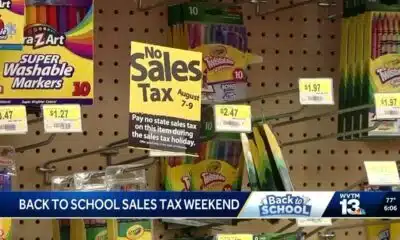(The Center Square) – Virginia lawmakers are shifting how the commonwealth handles access, pricing and regulation through a broad package of bills introduced in the 2025 General Assembly.
Gov. Glenn Youngkin signed the batch of drug-related legislation ahead of his March 24 deadline.
The governor signed 185 bills on Friday, which cover everything from hospital protocols and prescription transparency to criminal penalties and veterinary medicine.
Several of the bills address drug misuse and law enforcement gaps, especially in response to the ongoing fentanyl crisis and the increased use of substances like nitrous oxide.
House Bill 2308 adds restrictions on the distribution of nitrous oxide, often misused as a recreational inhalant.
House Bill 2319 legalizes drug-checking products like fentanyl test strips, which were previously classified as illegal paraphernalia.
“Harm reduction is a prudent approach to save lives and reduce risks associated with certain behaviors, including drug use,” said Robert Melvin, Northeast Region Director, R Street Institute. “By meeting people where they are and equipping them with the education, tools, and resources to make healthier choices.”
House Bill 2742 requires urine drug screening to include testing for fentanyl.
Other measures focus on modernizing how Virginia regulates prescriptions and how much patients and providers know about drug costs.
House Bill 2375 requires pharmacy services administration organizations to disclose pricing information.
House Bill 2378 allows the return of outdated therapeutic drugs to the dispensing pharmacy.
House Bill 1698 extends the retail sale and use tax exemption for prescription drugs purchased by veterinarians until July 1, 2027.
Other legislation clarifies how drugs can be administered or compounded in institutional settings like hospitals, long-term care homes and correctional facilities.
House Bill 1905 creates exceptions that allow hospital systems to distribute compounded drugs more easily within their networks.
House Bill 2473 allows long-acting injectable or extended-release prescription drugs to be administered in correctional facilities.
House Bill 2468 authorizes advanced registered medication aides to administer more types of medication.
Two additional bills update how Virginia classifies controlled substances and give pharmacists more flexibility in managing patient care. Drug therapy refers to the use of prescription medications to treat or manage medical conditions like high blood pressure or diabetes. Under the new law, pharmacists can adjust or manage those medications more freely under formal agreements with doctors.
House Bill 1582 expands the authority of pharmacists working with providers, while House Bill 1587 updates the state’s Drug Control Act by adjusting Schedule I and Schedule IV substances.











































